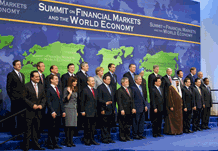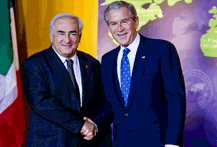
Typical street scene in Santa Ana, El Salvador. (Photo: iStock)
IMF Survey: World Leaders Launch Action Plan to Combat Financial Crisis
November 15, 2008
- G-20 leaders launch action plan to address financial crisis
- IMF central role in crisis response and reform of financial architecture
- Strauss-Kahn presses need for fiscal stimulus to revive growth
Leaders of the world's major economies have drawn up an action plan to combat the burgeoning financial crisis and pull the global economy back from one of the worst downturns in decades.

Laptops being assembled in Germany, where economic activity has slowed sharply in the third quarter. (photo: Zumawire)
G-20 summit
Leaders of the Group of 20 (G-20) industrialized and emerging market economies announced a series of immediate and longer-term actions to stabilize the financial system, stimulate domestic demand, help emerging and developing economies battered by the crisis, and strengthen the regulatory framework. They said they would hold a second summit by April 30, next year.
They stressed their commitment to ensuring that the International Monetary Fund (IMF), the World Bank, and other multilateral financial institutions had sufficient resources to continue playing their role in overcoming the crisis. Japan has announced its intention to lend the IMF an extra $100 billion to boost its resources.

G-20 leaders line up for a joint photo at the summit. (photo: IMF)
IMF Managing Director Dominique Strauss-Kahn welcomed the outcome of the two-day summit in Washington, calling the agreed action plan a significant step by the international community toward stronger cooperation aimed at resolving the global financial crisis and supporting the IMF's capacity to contribute to these efforts. The declaration gives the IMF a central role both in terms of crisis response and suggesting how to reform world financial markets.
Broad-based summit
"I am very pleased about the G-20 leaders' strong support for the important role of the Fund in crisis management and the reform of the international financial architecture," Strauss-Kahn said. "In addition to helping some member countries that are facing difficult circumstances with rapid and effective support, we have also created a new short-term liquidity facility and continue to review our instruments and facilities."
The G-20 comprises the seven major industrialized nations—Britain, Canada, France, Italy, Japan, Germany, and the United States—plus Argentina, Australia, Brazil, China, India, Indonesia, Mexico, Russia, Saudi Arabia, South Africa, South Korea, and Turkey. It also includes the 27-nation European Union, which was represented by Spain. Also attending were the heads of the United Nations, the IMF, the World Bank, and the Financial Stability Forum.
"Today's Summit was significant because of the people present. A new world economic order is developing that is more dynamic and more inclusive than any we have yet seen," Strauss-Kahn said. "The meetings are also significant because of what was agreed. The most important outcome of this weekend's meeting is agreement on an action plan and the commitment of all participants to implement the plan vigorously and fully. The IMF will give strong support to these efforts."

President Bush greets Strauss-Kahn at the start of the summit in Washington. (photo: IMF)
Strauss-Kahn, a former French finance minister who took over as head of the IMF a year ago, noted the G-20 leaders' commitment to act together to meet global macroeconomic challenges, using both monetary and fiscal policy. Lower inflation risks provide room to ease monetary policy, he said, adding that this will be important, but will not be enough.
"I welcome the emphasis on fiscal stimulus, which I believe is now essential to restore global growth," the Managing Director said, a point he had stressed in an earlier letter to G-20 finance ministers. "Each country's fiscal stimulus can be twice as effective in raising domestic output growth if its major trading partners also have a stimulus package."
He noted that the declaration recognizes that some countries have more room for maneuver than others. "We believe that those countries—advanced and emerging economies—with the strongest fiscal policy frameworks, the best ability to finance fiscal expansion, and the most clearly sustainable debt should take the lead," he said, adding that the IMF stands ready to advise on which measures, such as tax cuts or additional spending, will be the most effective.
He said the global stimulus needs to be large, in the order of 2 percent of world GDP, to make a sizeable difference to global growth prospects. "We are going to work on this with countries in the coming weeks and months," he added. He welcomed China's recent announcement of a $586 billion stimulus plan, saying this would shift Chinese policy and economy in the right direction.
Reinforcing international cooperation
Strauss-Kahn noted the G-20's endorsement of strengthening the IMF's mandate in the areas of macroeconomic surveillance, lending to member countries in need, and providing assistance to build up capacity in emerging market and developing countries. He welcomed agreement that the role of the IMF in providing macro-financial policy advice would be enhanced, including the request that the Fund and others develop recommendations to mitigate pro-cyclicality in regulatory regimes. "This is very important at this time," he added.
Strauss-Kahn noted that the action plan agreed at the summit pointed to the role of the IMF in supporting the plan's implementation, including some immediate actions by March 31, 2009. He praised the agreement on principles for reform of financial markets, and especially the commitments to reinforce international cooperation.
"The IMF's role in reform of financial markets is based on our responsibility for surveillance of the global financial system, which was part of the original Bretton Woods agreement," he said. "It is also based on our capacity to analyze the relationships between financial markets and the real economy. We have already seen how important these relationships can be. The world must understand them better, and the IMF will do its part to make this happen."
"I am particularly pleased that all G-20 members have committed to participating in the IMF's Financial Sector Assessment Program," he added. "This will ensure a transparent review of countries' regulatory systems."
Ensuring sufficient resources
Strauss-Kahn stressed to reporters the important role of the IMF in crisis response and developing early warning systems to spot when countries may be getting into trouble. He welcomed the leaders' commitment to strengthen the IMF's capacity to fulfill its mandate of macroeconomic surveillance, lending to member countries in need, and providing assistance to build up capacity in emerging market and developing countries.
"It is an important signal that the world is committed to ensuring that the IMF, World Bank, and other multilateral development banks have sufficient resources to help our members overcome the crisis," he stated.
In a separate statement, Strauss-Kahn welcomed Prime Minister Taro Aso's announcement that Japan is prepared to lend up to $100 billion to the IMF. "This is a major contribution to maintaining the stability of financial and capital markets, and clearly demonstrates Japan's leadership and strong commitment to multilateralism," he said.
The IMF has acted quickly to help emerging markets caught up in the crisis. It has finalized loans for Hungary and Ukraine, and announced agreement in principle with Pakistan. A loan for Iceland is also due to be considered by the IMF's Board on November 19.
Comments on this article should be sent to imfsurvey@imf.org


